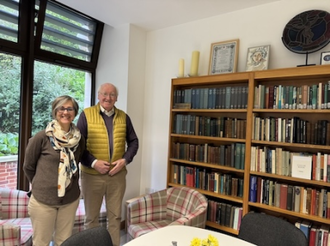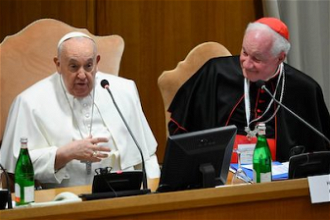St John Henry Newman: a life dedicated to the supremacy of truth

Dr Anna Abram and Kevin, friend of the Newman Association, with Prof Lash's Newman library
'To live is to change and to be perfect is to have changed often'
A reflection upon the life and work of St Cardinal John Henry Newman is to be presented with a set of challenges: what to cite and in what order and where should the emphases of his immense legacy - intellectual and spiritual - be placed?
Born in London in 1801, his life witnessed to an incredible confluence of mind, spirit and integrity of character. In addition to the letters (numbering more than 20,000), journals and collections of sermons he left behind, his literary output was admirable (James Joyce once referred to Newman in a letter as 'the greatest of English prose writers' while Edward Elgar set Newman's Dream of Gerontius to music).
The essentials of the first half of his biography were dominated by Oxford where he took up a place at Trinity College, became a fellow at Oriel (where he is commemorated in an impressively detailed stained-glass window in the chapel), took Anglican Orders, served as Vicar of the University church of St Mary the Virgin for fifteen years, and became one of the founding members of the Oxford Movement.
It was the Oxford Movement that would presage his break with the Anglican faith into which he had been born and his subsequent conversion to the Catholic Church. His extensive and close reading of the Fathers of the Early Church had caused him to conclude in the infamous Tract 90 that the foundations of the Anglican faith (the Thirty-Nine Articles) were 'fundamentally Catholic, as all Protestant faiths broke first from the Church of Rome.' This unleashed a storm of furious disapprobation. In Newman's resignation letter of 1841 to his Bishop, he wrote, 'I have nothing to be sorry for, but everything to rejoice in and be thankful for. … I have acted because others did not act, and have sacrificed a quiet which I prized. May God be with me in time to come, as He has been hitherto! And He will be if I can but keep my hands clean and my heart pure. I think I can bear, or at least will try to bear, any personal humiliation, so that I am preserved from betraying sacred interests, which the Lord of grace and power has given into my charge.' Though never diverging from the path he was to follow, it was not without cost. His spiritual autobiography, Apologia pro vita sua, written some 20 years after his conversion, reads tellingly and movingly as a spirited and heartfelt response to criticism over his break with Anglicanism. Of the Apologia, the late Professor Nicholas Lash* once wrote that it left him 'in no doubt of the pervasiveness of pain, suffering and disaster in the world'.
As a Catholic, Newman was ordained a priest and was later to be appointed a cardinal, taking as his motto 'heart speaks to heart'. Influenced by the joyous spirit of St Philip Neri, he went on to found oratories in London and Birmingham; as a fervent proponent of education, he was responsible for the founding of institutions in both the school and university sectors. Sensitive, occasionally given to aloofness, his greatest denouncement was to call someone or something 'unreal'. Newman was also noted for possessing a 'genius' for friendship, a ready wit and gentleness. Though it is his intellectual output that is given the greatest attention, his spiritual and pastoral sensitivity were of great renown. He lived out his pastoral calling in Birmingham with huge sensitivity through being attuned to, and working tirelessly with, the urban poor (thousands of whom wept openly and lined the street on the day of his requiem), the bereaved and those serving time in prison.
Pope Paul VI spoke of Newman as the 'absent Father of Vatican II' a reference to Newman's life's work as having anticipated the foundational themes of the Council including the supremacy of conscience, the Church as a communion, a return to the Scriptures and the early Church Fathers, the rightful place of the laity, the work for unity and for the Church to take its place in the modern world. Observing Newman's legacy from a C21 perspective, it is his work on conscience to which we need urgently to turn. When Pope Benedict XVI was called to name the high point of his papacy, he singled out the beatification of Newman. Having lived through Nazism in his native Germany, Benedict XVI had read Newman's theology of conscience and was to be possibly one of the greatest exponents of Newman's teaching in this field. As Josef Rattzinger, he had experienced firsthand the claim of a totalitarian party which understood itself as the fulfilment of history and which negated the conscience of the individual. To this end, he recalled one of its leaders as having said, 'I have no conscience. My conscience is Adolf Hitler'. Newman spoke of the conscience as an 'echo of God' or the 'connecting principle' between us and our Creator. For Benedict XVI, the 'silencing of conscience leads to the dehumanisation of the world and to moral danger, if one does not work against it […]. Obedience to the truth must stand higher than any human tribunal.' At a time when truth is increasingly under threat by the forces of subjectivism and relativism, Newman's life, thought and works - all of which witnessed to the primacy of truth - have an especial insistence.
Newman died in 1890 at the age of 89. The pall laid over his coffin bore his cardinal's motto and on his memorial stone was the inscription: 'Ex umbris et imaginibus in veritatem' ('From shadows and images into truth'). Canonised by Pope Francis at St Peter's in October 2010, St John Henry Newman's feast day is celebrated on the 9th of October.
*Date for your diary:
Celebrating 46 Years of Nicholas Lash: A Memorial Lecture on 7 November, at 6 pm Fisher House (Guildhall Street, Cambridge CB2 3NH), our close partner, will host the Nicholas Lash Memorial Lecture.
See: www.mbit.cam.ac.uk/news/post/celebrating-46-years-of-nicholas-lash-a-memorial-lecture/
NB: Nicholas Lash bequeathed his valuable collection of books by and about St John Henry Newman - including his own bound PhD thesis along with a separate volume of notes - to the Margaret Beaufort Institute (once, in an article written some years ago, he had referred to these works as having taken up some 10 feet of shelving in his study). A great number of these works were annotated by Professor Lash and are of scholarly value to both Newman, and Lash, scholars. They are housed in the Institute's library.


















